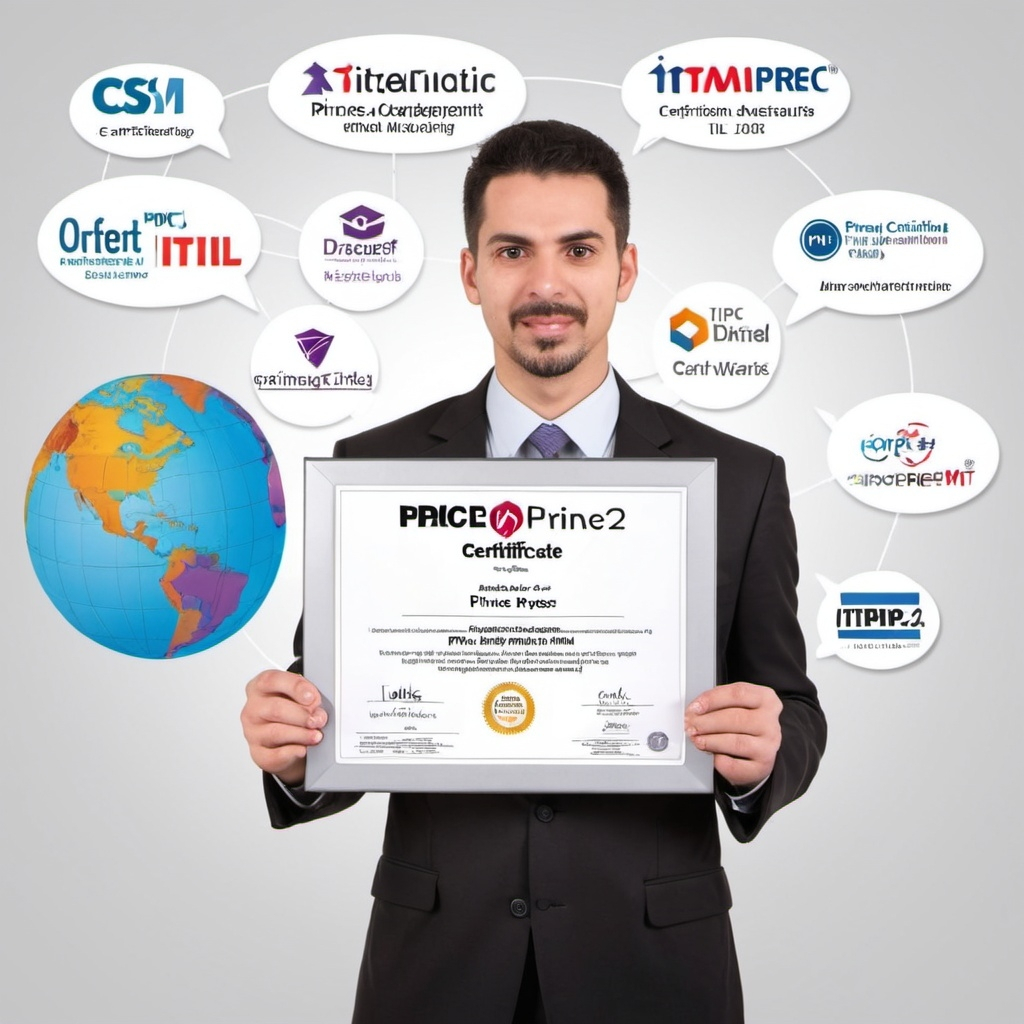PMP / PRINCE2
Certifications have been there from some time now. The industry particular the software industry needs people who are SMEs or experts in a particular field. The scenarios in this industry are changing fast. Technology is changing at a tremendous speed. In fact in project management, possessing the right credentials can be the difference between career stagnation and professional growth. Among the myriad of certifications available, Project Management Professional (PMP) and PRINCE2 (Projects IN Controlled Environments) stand out as two of the most respected and sought-after qualifications. These certifications not only validate an individual’s expertise in project management but also significantly enhance their career prospects.
Both PMP and PRINCE2 have their unique methodologies and applications, catering to various industries and project requirements. PMP, administered by the Project Management Institute (PMI), is globally recognized and emphasizes a comprehensive understanding of project management principles and practices. On the other hand, PRINCE2, developed by AXELOS, is a process-driven methodology primarily used in the UK and European countries, focusing on clear project control and organization.
Understanding the practical applications and real-world benefits of these certifications is crucial for anyone considering a career in project management. This article delves into the importance of PMP and PRINCE2 certifications, illustrating their value with real-world examples and comparing them with other notable certifications. By the end, you’ll have a clearer picture of how these qualifications can propel your career and why they are considered indispensable in the field of project management.
The Significance of PMP Certification
Global Recognition and Career Advancement
The PMP certification is renowned worldwide, making it a valuable asset for project managers looking to work in different countries or multinational companies. It demonstrates a solid foundation in project management, adherence to best practices, and a commitment to the profession.
Real-World Example: Jane Doe, a project manager at a leading tech firm, found that her PMP certification opened doors to international projects. Her knowledge and skills, validated by the certification, gave her the confidence to lead a cross-functional team in developing a new software product for a global market. The PMP credential not only enhanced her credibility but also significantly boosted her career trajectory, leading to a promotion and an expanded role within the company.
Comprehensive Knowledge and Skill Enhancement
The PMP certification process equips candidates with a broad understanding of project management processes, tools, and techniques. The PMBOK (Project Management Body of Knowledge) guide, which forms the basis of the PMP exam, covers areas such as scope management, time management, cost management, quality management, and risk management.
Real-World Example: John Smith, a project manager in the construction industry, used the knowledge gained from his PMP certification to streamline project processes and improve efficiency. By applying best practices in risk management and stakeholder communication, he successfully completed a complex construction project ahead of schedule and under budget, earning accolades from his clients and stakeholders.

Networking Opportunities
Being part of the PMI community offers numerous networking opportunities through local chapters, conferences, and online forums. This can be invaluable for career growth, as it allows professionals to connect with peers, share experiences, and learn about new trends and opportunities in the field.
Real-World Example: Maria Gonzalez, a PMP-certified project manager, attended a PMI conference where she met several industry leaders and potential clients. These connections helped her secure a high-profile project and expanded her professional network, providing her with continuous learning and collaboration opportunities.
The Significance of PRINCE2 Certification
Structured Methodology and Flexibility
PRINCE2 offers a structured approach to project management with clearly defined roles and responsibilities, stages, and processes. Its flexibility allows it to be tailored to suit specific project needs, making it a popular choice in both public and private sectors.
Real-World Example: David Brown, a project manager in the healthcare sector, implemented PRINCE2 methodology to manage the development of a new patient management system. The structured approach ensured that every team member knew their roles and responsibilities, and the project stages were clearly defined. This led to improved coordination, efficient resource utilization, and successful project delivery.
Focus on Business Justification
One of the key principles of PRINCE2 is ensuring that projects have a clear business justification. This means that every project must have a valid reason for initiation and continued investment, aligning with the organization’s strategic objectives.
Real-World Example: Emily Clark, a project manager in a financial services company, used PRINCE2 to justify a project aimed at upgrading the company’s online banking platform. By continuously assessing the business case throughout the project lifecycle, she ensured that the project remained aligned with business goals and delivered tangible benefits, such as increased customer satisfaction and reduced operational costs.
Enhanced Project Control and Governance
PRINCE2 emphasizes rigorous project control and governance, with regular reviews and checkpoints to ensure projects stay on track. This helps in managing risks, issues, and changes effectively, leading to more predictable project outcomes.
Real-World Example: Michael Johnson, a project manager in the public sector, utilized PRINCE2 to manage a government-funded infrastructure project. The regular review processes and governance structure helped him identify and address potential issues early, ensuring that the project was completed within the stipulated time and budget, and met all regulatory requirements.

Comparative Analysis: PMP vs. PRINCE2 vs. Other Certifications
To provide a comprehensive view, let’s compare PMP and PRINCE2 with other popular project management certifications like Certified ScrumMaster (CSM), Certified Agile Project Manager (IAPM), and Lean Six Sigma.
| Certification | Key Focus | Primary Regions of Use | Methodology | Ideal For | Exam Requirements |
|---|---|---|---|---|---|
| PMP | Comprehensive PM principles & practices | Global | PMBOK Guide | Experienced project managers | 4-year degree, 36 months experience, 35 hours PM education |
| PRINCE2 | Process-driven, structured approach | UK, Europe | PRINCE2 methodology | Both beginners and experienced managers | Foundation and Practitioner exams |
| CSM | Agile project management | Global | Scrum framework | Agile project teams | 2-day course, exam |
| IAPM | Agile & classical PM practices | Global | IAPM Guide | Managers looking for dual approach | Knowledge-based exam |
| Lean Six Sigma | Process improvement & efficiency | Global | DMAIC methodology | Process improvement specialists | Green/Black Belt training, exam |
Summary
Both PMP and PRINCE2 certifications offer significant advantages for project managers, from enhancing career prospects and global recognition to providing comprehensive knowledge and practical skills. While PMP focuses on a broad spectrum of project management principles, PRINCE2 provides a structured, process-oriented approach. Understanding the unique benefits and practical applications of these certifications can help project managers choose the right path for their professional development.

By investing in a PMP or PRINCE2 certification, project managers not only validate their expertise but also gain access to a wealth of resources, networking opportunities, and career advancements. Whether working on complex international projects or ensuring rigorous project governance in the public sector, these certifications provide the tools and frameworks necessary for successful project delivery. In the dynamic and demanding field of project management, possessing such credentials can be a decisive factor in achieving professional excellence and making a meaningful impact in the industry.




